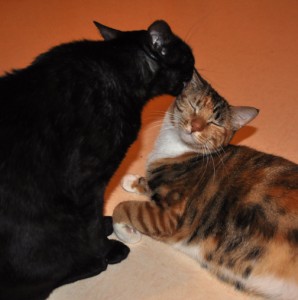While browsing blogs last weekend, I came across a post from Steve Pavlina about finding your life’s purpose…. in 20 minutes. I have lived my life in a purposeful manner, conscious of my personal development, and thought it would be a snap to come out of this exercise with a concise, clear statement of the purpose of my life.
Wrong.
Pavlina suggests that we sit down with pen and paper or a new wordprocessor file, title the page, “What is my true purpose in life?” and answer the question until one of the answers makes us cry. I wrote pages and pages of answers and none of them brought even one tear to my eye. All the things I have done in my life — education, travel, service — and none of them is my true purpose?
 I almost gave up on the exercise several times, but I did stick with it for more than an hour. In the end, I whimpered a bit when I wrote that my purpose in life is to be loved by cats. It was late, and my cats were hanging around waiting to demonstrate their love for me by letting me feed them and then cuddling up with me for the winter night. I put the computer away and let my little colony shower me with affection.
I almost gave up on the exercise several times, but I did stick with it for more than an hour. In the end, I whimpered a bit when I wrote that my purpose in life is to be loved by cats. It was late, and my cats were hanging around waiting to demonstrate their love for me by letting me feed them and then cuddling up with me for the winter night. I put the computer away and let my little colony shower me with affection.
Pavlina said some people — “those who are very entrenched in low-awareness living” — might need more than an hour to uncover their purpose. They might need to write down 500 answers to the questions before one of the statements breaks them open.
I decided to try again. On the 46th line of round two, I wrote, “My purpose is to make the world a little bit more beautiful and loving and to help others find the place in themselves where it becomes possible for them to reduce suffering as well.”
This answer produced the open feeling in my heart … and the tears. In addition, the statement logically rings true with my history.
When I am feeling harmony, my activities are obviously contributing to added beauty and reduced suffering. When I feel out of sorts, generally, I’m spinning my wheels in mud, causing pain or contributing to the ugliness in the world. Or I feel like I am. Sometimes, moving toward a personal place where we can reduce the suffering in the world may cause some initial pain. When I facilitate someone taking tentative first steps on the path of self discovery, I may appear to be causing that pain. That’s short-term thinking, however.
In the long term, some of my students who seemed to be suffering the most have come back to me later and thanked me for sticking with them and insisting that they learn. That’s a life of purpose.

by GadgetGrl
19 Feb 2012 at 10:33
Dear Useful Pleasant Lives, Thank you for this post. I am sitting down with my computer and my online class and I am going to have to provide “tough love” to a couple of students who are not going to like what I have to say. I’m going to do it anyway.
In the long run, I am educating a diverse workforce of future nurses, and that is a worthy purpose indeed. But today I’m holding the students to standards they haven’t internalized yet, such as deadlines, proper attribution of reference sources and standards. Not a popular job really. One student wrote on his evaluation “the tests are a setup for failure”. In contrast to another student who thanked me for providing the type of rigor he’d experience in a summer at an ivy league school.
Long term, whether the students become nurses or not, they need to learn to work within parameters, standards and deadlines. I hope they will come to appreciate it. I don’t think anyone really benefits from being lied to about an evaluation of their work, especially if you are willing to help them learn or improve. After all, that is what I really think I can contribute: coaching to success.
Back to grading! GadgetGrl
by Courtney~Mommy LaDy Club
21 Feb 2012 at 11:58
How interesting! That is truly a good test to try.
Nice to find you on grow your blog!
Courtney
http://club-content.com/discount-page/
Teaming together for blog performance!